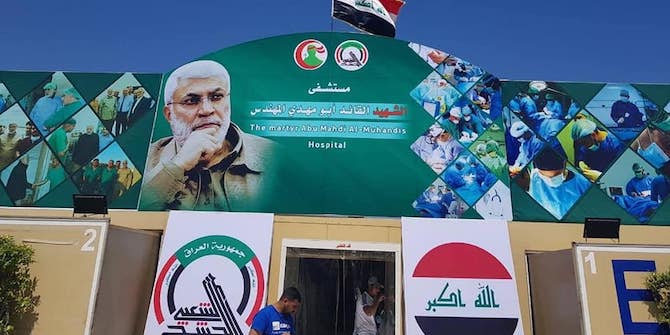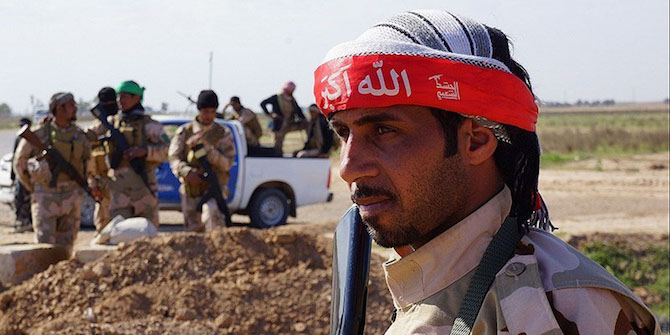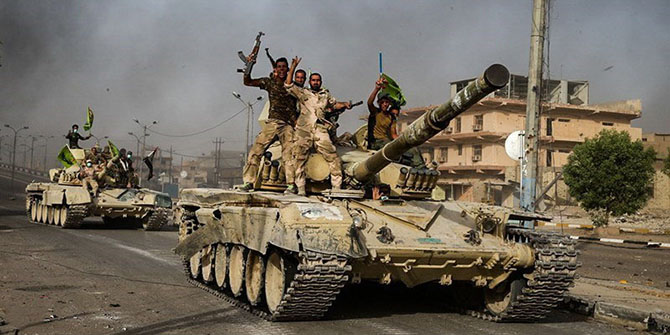by Jessica Watkins

Iraq’s battle against COVID-19 has largely slipped under the radar of international scrutiny as nations across the globe struggle to manage their own COVID-19 related domestic crises. As of 27 April, the official count of those affected in Iraq stood at 1820 recorded cases and 87 deaths: a fraction of the confirmed cases in European countries or the US. But given the limited medical resources of Iraq’s governorates and the extreme lack of public trust in Iraq’s public health sector, few people believe that this figure comes anywhere close to the reality.
The Iraqi government response has been to impose curfews, prohibit large gatherings, and restrict outings to essential tasks. But the notion of social distancing is questionable in densely populated urban areas, particularly the slum districts of Baghdad. And the inability of the Ministry of Health to undertake testing and provide sufficient care to those affected, let alone to support the most vulnerable members of society, even with the assistance of the federal police and Iraqi army, has created openings for the Popular Mobilisation Forces (PMF).
The PMF, or Hashd, have become a defining feature of Iraq’s security and political landscape over the past 5 years. Their integral role in defeating ISIL was a core factor in the Prime Minister’s decision to incorporate them as an independent unit into Iraqi security services in February 2016 (reinforced in March 2018). It was also the main reason for the success of Fatah, an alliance incorporating the key ‘pro-Iran’ components of the Hashd, in the 2018 parliamentary elections. The bloc won 48 out of 329 seats (over 14%), and in view of Iraq’s fragmented political scene, that result has given it a decisive role in the post-ISIL Iraqi government.
Since then, the PMF have been institutionalised under a central directorate chaired by Falih al-Fayyadh. The ‘real’ figure of authority, however, until his assassination by US forces in January, was former Kata’ib Hezbollah leader, Abu Mahdi Al-Muhandis. Formally accountable to the Prime Minister, the PMF directorate has nonetheless acted with relative autonomy, and while the Hashd have been assigned brigade numbers in a bid to unite them under a common command, most remain primarily loyal to their own commanders. The agendas of these commanders are diverse. The most prominent groups, including Badr, Kata’ib Hezbollah, Asa’ib Ahl al-Haq, Harakat al-Nujba, and the Imam Ali Brigades, are close to Iran, but not always close to each other. Others, including the ‘Shrine’ PMFs, are answerable to Sistani. For his part, Moqtada al-Sadr has repeatedly called for the dissolution of the PMF, despite the fact that his Sarayat al-Salam (‘Peace Companies’ – a reincarnation of the Jaysh al-Mahdi) are officially incorporated into the PMF, and as a consequence receive state salaries. The death of Muhandis has further factionalised the PMF, and the ability of any successor to unite them is doubtful.
Gauging popular perceptions of the Hashd today is challenging. In the aftermath of ISIL’s defeat, polls in 2018 in predominantly Shi’a provinces indicated exceptionally high approval ratings. Even in the predominantly Sunni provinces, a sense of gratitude to the Hashd for ejecting ISIL translated into reasonably high levels of confidence in the PMF as positive contributors to local security. Since then, however, the primary role of individual PMFs has shifted and their core raison d’être has become rather more ambivalent. Justifying their continued grip over local economies and political structures, individual PMFs have pursued a range of projects to enhance public services over the past few years, from providing emergency welfare packs to the poor; to building schools, dams, and public buildings; delivering clean water; and helping pilgrims at border crossings. Indeed, by investing in logistical and technical expertise, the PMF have been able to provide certain solutions (however short-term) to pressing public needs with greater flexibility than bloated local government administrations. All the same, in many areas, the monopoly developed by PMFs over the black market, employment opportunities and the allocation of public sector contracts has cast them in a rather more predatory light. Anecdotal evidence certainly suggests that the role played by pro-Iranian PMFs in repressing pro-reform protests since October last year has negatively impacted their image. And overall, the number of active PMF units has fallen considerably over the past year. In the past 12 months, the Washington Institute’s Shi’a Militia Mapping Project has registered reports of 242 Shia militant groups in Iraq (brigades within the same overall group are counted separately); 162 fewer than the 12 months before that.
COVID-19 has produced renewed opportunities for the PMF to prove their worth to Iraqis. From the beginning of March, the PMF Directorate has announced several campaigns across the country to manage various aspects of epidemic. Beyond broadcasting and distributing advice on public health, the main components of the ‘Awareness’, ‘Curbing the Pandemic’ campaigns have included providing a range of logistical, medical and volunteer support to the local and federal authorities. Core activities have included transporting the bodies of deceased victims for burial, distributing food aid packages to those in isolation, sterilising and fumigating public sites and residential areas, transporting medical supplies and personal protective equipment. The disinfection cleaning process which the Hashd began in Hurriyah district, north of Baghdad, where many of the first cases of the virus were recorded in March was subsequently extended to other parts of the capital and the country. And, in another recently launched campaign, (‘Mercy Soldiers’) the PMF Directorate set up psychological support channels for medical personnel treating victims of the virus.
Meanwhile, the PMF’s Logistics Support Co-operative has also contributed by building temporary and mobile hospitals in Samawa (Muthanna Governorate), Karbala and Nasriya, naming them after Al-Muhandis, and display large banners of the deceased leader outside. A PMF spokesperson told Al-Araby al-Jadid that the PMF experience in operating hospitals during their battles against ISIL put it in a strong position to assist the Ministry of Health with the current crisis.
Beyond the coordinated efforts of the PMF directorate, individual groups have launched multiple initiatives of their own. In mid-March, Moqtada al-Sadr announced the launch of ‘the Nation Campaign’, whereby the 5th Brigade of the Peace Companies cleaned, disinfected and fumigated public sites, institutions and neighbourhoods across Western Baghdad. This was followed by a similar cleaning campaign in parts of Eastern Baghdad and the distribution of food supplies to parts of Sadr City and Al-Shula. The campaigns appear to be at odds with Sadr’s earlier endorsement of pilgrims continued visits to shrines and worshippers attending mosque services, but underscore the perceived importance of taking an active stance in the interests of the Iraqi people.
The Ahmed al-Mihna association, an NGO affiliated with Kata’ib Hezbollah Brigades, has also been distributing food aid and public health pamphlets over the past 6 weeks across southern Baghdad (Nahrawan and Abu Dashir) and north of Baghdad (Shuala, Al Hurriya, Al Shaab District, Sadr City, Al Amel and Media District), as well as in Maysan, Nasiriya, Kut, Basra, Karbala, and parts of Salah al-Din. And also in mid-March, the 15th Brigade of the PMF (the Quwat al-Shaheed al-Sadr, aka the National Defence Brigades, who are affiliated with the Da’wa Party) launched a blood donation campaign ‘to support coronavirus victims’. It is unclear whether the COVID-19 crisis has actually presented additional demands for blood supplies, but amongst the Hashd, appeals to donate blood have become a recurring means of demonstrating a willingness to serve the public. Only a few months have passed since several PMFs called for a blood donation drive to support the victims of violence during the popular protests.
Iraq’s PMF are undertaking many of the same public services that both military forces and community volunteer groups are currently performing across the world, and there is no question that in Iraq, the need for public service at a time of crisis is pressing, even if some of the PMF are arguably more motivated by the prospect of future political gains than by the present prerogative of saving lives. Yet, there is an irony in the fact that by performing these services, the PMF are further undermining the credibility of Iraqi state institutions, even while they are now officially amongst them.
Note: This piece was originally published on the Conflict Research Programme (CRP) blog. The CRP blogs gives the views of the author, not the position of the Conflict Research Programme, the London School of Economics and Political Science, or the UK Government.







Dear sir/madam,
Is there an Arabic version already or proposed? If yes, it will save me a lot of time and effort.
“The CRP blogs gives the views of the author, ”
The CRP blogs give the views of the authors,
Regards,
Muhamad Tawfiq Ali
(FCIL)